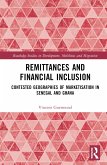With the arrival of the 'Internet of Things' (IoT), smartphones, real-time payments systems, plus FinTech activity, Financial Inclusion services can now be integrated into a country's National Payment System (NPS), which means there should be no systemic barriers to transitioning the socio-economic pyramid, as actors build their financial status. This, however, is not the case. This book is a comprehensive guide to understanding the transition of financial services from cash-based to digital-based systems, with a focus on Financial Inclusion.
It explores the success of Financial Inclusion programs in promoting economic activity and lifting people out of poverty. It does not concentrate on a single deployment or approach, rather, it takes a broader view. The book surveys the technology and infrastructure required to build digital payment systems, as well as the regulatory and governance frameworks that enable their operation, however, the major focus is on the incorporation of these financial services within communities in order to deliver social outcomes. The book opens the conversation, proposing a new method of measuring Financial Inclusion. It takes a critical but constructive look at the field over the last 20+ years and discusses the key learnings. It examines the Kenya mobile money approach to Financial Inclusion, compared with the Indian bank lead approach, and delivers a broad-based plan on how the programs can be more effective in the future.
Financial Inclusion requires a pathway to progress, through a period of technology transformation. The foundation is provided by this book and the reader, on finishing it, will have a comprehensive appreciation of the subject matter.
It explores the success of Financial Inclusion programs in promoting economic activity and lifting people out of poverty. It does not concentrate on a single deployment or approach, rather, it takes a broader view. The book surveys the technology and infrastructure required to build digital payment systems, as well as the regulatory and governance frameworks that enable their operation, however, the major focus is on the incorporation of these financial services within communities in order to deliver social outcomes. The book opens the conversation, proposing a new method of measuring Financial Inclusion. It takes a critical but constructive look at the field over the last 20+ years and discusses the key learnings. It examines the Kenya mobile money approach to Financial Inclusion, compared with the Indian bank lead approach, and delivers a broad-based plan on how the programs can be more effective in the future.
Financial Inclusion requires a pathway to progress, through a period of technology transformation. The foundation is provided by this book and the reader, on finishing it, will have a comprehensive appreciation of the subject matter.








